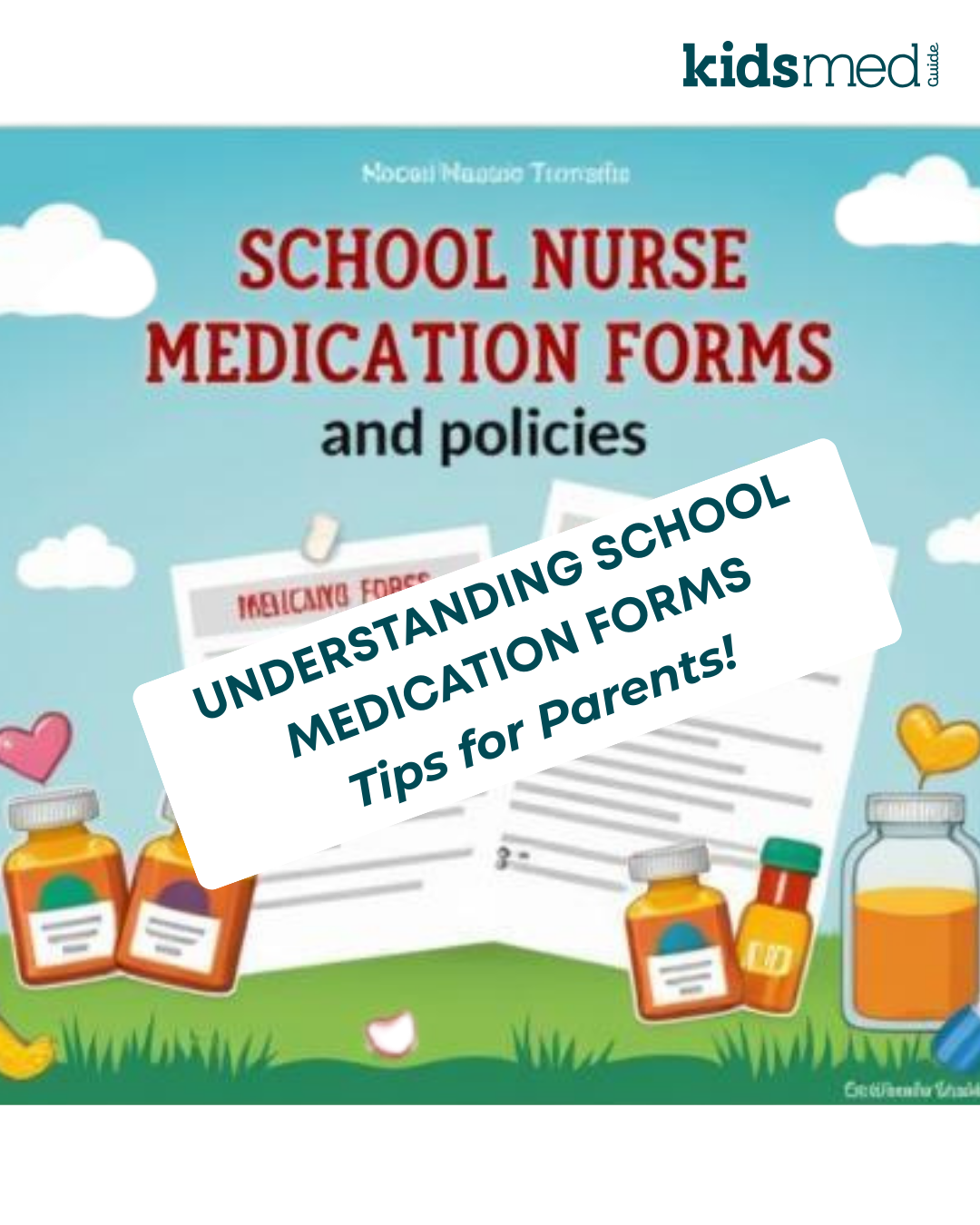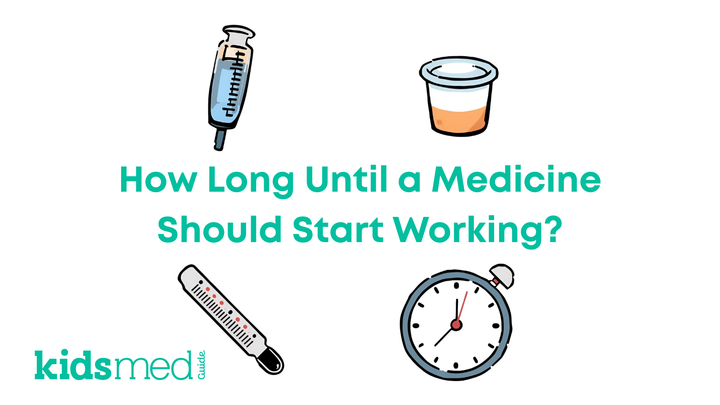Understanding School Nurse Medication Forms and Policies

The start of school always involves a lot of paperwork and forms, especially if your child is in preschool or daycare! If your child needs medication at school, the list of forms becomes even longer.
The good news is that school nurse medication forms and policies are designed to protect children and keep them safe.
Why School Medication Policies Matter
School medication policies are in place to protect students and staff. These policies establish guidelines for how medications are stored, administered, and recorded. They also ensure that schools comply with state and federal regulations, which vary by state and by school district, but generally require documented permission from parents and healthcare providers before administering any medication at school.
The goal is child safety. Proper medication administration decreases the risk of errors, prevents misuse, and ensures children receive the treatments they need.

School Nurse Medication Forms: What Parents Need to Know
Most schools require various forms to be completed before a nurse or staff member can administer medication to a child.
- Parent/guardian consent forms: You will need to sign a document authorizing the school to give your child medication.
- Healthcare provider authorization: A doctor, nurse practitioner, or physician assistant must give written instructions in the form of a prescription or order. These should include the medication name, dose, frequency, and reason for use.
- Emergency care plans: For conditions like asthma, seizures, or diabetes, schools often require an action plan that details what to do in urgent situations.
Learn more! Check out our Asthma Action Plan guide and our post on Tips for Managing Asthma in Sports and School.
These forms must be completed and submitted before the school year begins and before introducing any new medication. Incomplete or late forms are among the most common reasons for delays in administering medication.
Medication Administration in Schools
Role of school nurses
School nurses do a lot! They are usually responsible for all of the students' health forms and paperwork, including tracking all of the kids who need medicine administered during the day and working with teachers to make sure those children get their medicine at the right time. They’re also responsible for ensuring that medication is appropriately stored and accessible in an emergency.

Safe handling of medications
Schools enforce strict rules to ensure medicines are stored safely. It can vary by state and school district. Parents are usually required to bring medications directly to the nurse in their original pharmacy-labeled containers, and may need to provide supporting documents from the pediatrician (such as an asthma action plan, insulin regimen, or detailed instructions for something like seizures or allergy attacks).
Most school policies require that all medication doses administered during the school day be documented. Controlled substances at school should be stored in a locked area, and the inventory must be recorded with each dose.
Emergency medications
For children with asthma, severe allergies, epilepsy, or other medical conditions that may require emergency medication, quick access to these life-saving drugs is imperative.
Schools usually have specific protocols to ensure these are readily available, and some states allow students to carry their own emergency medications with proper authorization (federal law encourages this).
Teachers and support staff may also receive extra training to recognize emergencies and administer emergency meds when the nurse is unavailable.
Preparing Families and Students for Medication Management at School
- Complete forms early: Submit everything before school starts.
- Communicate with staff: Meet with the school nurse or teacher to review your child’s medication plan.
- Educate your child: Depending on their age, teach them the basics about their medicine, why they take it, and what symptoms to report.
- Plan for field trips and after-school activities: Ask how medications are managed outside the classroom.
These steps reduce last-minute paperwork stress or calls from the nurse about incomplete paperwork (sooooo many forms!)
Common Challenges and How to Overcome Them
- Incomplete forms: Make sure both parent and provider sections are filled out.
- Medication updates: If a medication is modified, notify the school and send in the latest prescription or paperwork.
- Miscommunication: Maintain open communication with the nurse and teachers.
Conclusion
School nurse medication forms and policies might seem like extra homework (it’s as fun as indoor recess!), but they’re necessary. Work on the forms early, before school starts or as soon as you get an updated prescription or action plan. Good luck, parents!
FAQ Section
What information is required on school medication forms?
Most forms ask for the child’s name, date of birth, medication details (name, dose, route, frequency), the reason for taking the medication, and signatures from both a parent or guardian and a healthcare provider.
Who can administer medications at school?
Typically, the school nurse is responsible for this. In some cases, trained staff may give medications if a nurse isn't available, in accordance with state laws and school policy.
How are emergency medications handled?
Emergency medications, such as EpiPens or inhalers, must be readily accessible at all times. Depending on state law, students may be allowed to carry them, or staff will be trained to use them quickly in case of emergency.
What should parents do if their child’s medication changes during the school year?
Notify the school nurse immediately, provide a new prescription label, and update all forms. Schools cannot administer new doses without up-to-date documentation.
Are there legal requirements for medication administration in schools?
Yes. Federal laws such as Section 504 of the Rehabilitation Act and the Individuals with Disabilities Education Act (IDEA) require schools to accommodate students with medical needs. States and districts also have specific regulations that guide daily practices.
The following references were used to compile this information:
Bergren, M. D. (2022). NASN’s Medication Administration Clinical Guideline. NASN School Nurse, 37(4), 176–178. https://doi.org/10.1177/1942602X221098735
Individuals with Disabilities Education Act (IDEA) | U.S. Department of Education. (n.d.). Retrieved September 8, 2025, from http://www.ed.gov/laws-and-policy/individuals-disabilities/idea
Miotto, M. B., Balchan, B., Combe, L., COUNCIL ON SCHOOL HEALTH, & NATIONAL ASSOCIATION OF SCHOOL NURSES. (2024a). Safe Administration of Medication in School: Policy Statement. Pediatrics, 153(6), e2024066839. https://doi.org/10.1542/peds.2024-066839
Miotto, M. B., Balchan, B., Combe, L., COUNCIL ON SCHOOL HEALTH, & NATIONAL ASSOCIATION OF SCHOOL NURSES. (2024b). Safe Administration of Medication in School: Policy Statement. Pediatrics, 153(6), e2024066839. https://doi.org/10.1542/peds.2024-066839
Section 504 | U.S. Department of Education. (n.d.). Retrieved September 8, 2025, from https://www.ed.gov/laws-and-policy/individuals-disabilities/section-504



